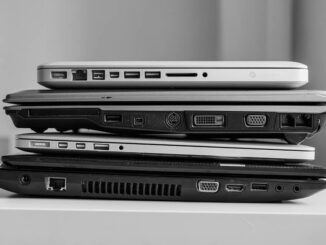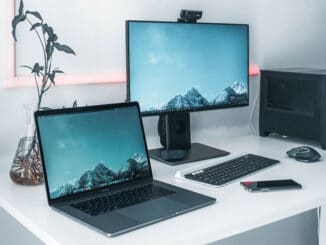While several excellent gaming laptops are available today, some users have claimed that their laptop overheats when playing games. This may be a significant issue, resulting in decreased output and hardware degradation in certain situations, but there is a solution.
Laptop overheating is a major concern that usually happens while doing stressful activities on the laptop, such as playing sports. In the case of overheating, users have identified the following issues:
Table of Contents
How to Solve Overheating Laptop Problem
Use Integrated Graphics
Dedicated and integrated graphics are used on all gaming computers, and if your machine is overheating, your dedicated graphics likely are to blame. Dedicated graphics absorbs more electricity and produces more heat, which might cause your laptop to overheat if you’re playing a hardware-intensive game.
As a temporary solution consider using embedded graphics to solve the issue. Since integrated graphics do not use as much power as dedicated graphics, they do not generate as much heat. On the other hand, the embedded graphics do not have the same level of output as a dedicated graphics processor. As a result, you cannot achieve the highest outcomes in those sports.
Use a Cooling Pad
If your laptop overheats when playing games, it may be due to a lack of ventilation. However, by buying a cooling pad, you can efficiently resolve this problem. These machines are beneficial, as they can provide additional ventilation for your laptop and assist you in lowering its temperature.
If you don’t want to spend the money on a cooling pad, put your laptop on a clean, smooth surface. Placing your laptop on your bed or your lap is a terrible idea because the fans will get clogged with dust and debris, causing your laptop’s temperature to increase.
Limit Your FPS
Per consumer strives for a high FPS when gaming. Higher frame rates suggest a more enjoyable gameplay experience, but they can also cause the machine to overheat. Your gaming success may be causing your laptop to overheat when you’re playing sports.
Underclock Your Graphics Card
To improve speed, several users overclock their graphics cards. On the other hand, overclocking places more strain on the hardware, allowing it to produce more heat. Overclocking will inevitably cause the laptop to overheat during gaming sessions.
If your hardware is overclocked, it’s likely causing the problem, so switch off all overclocking options and restore default settings. If the issue continues even with the default settings, you might want to suggest underclocking your hardware.
To minimize energy usage and heat generation, you must lower your hardware settings to underclock it. Remember that underclocking your computer can result in lower efficiency, but it will save your laptop from overheating.
Change Power Settings
According to users, your power settings are likely causing the issue if your laptop overheats when playing games. Several users have mentioned that adjusting their power settings fixed the issue, so you may want to try that.
Clean Your Laptop
If you’re always experiencing problems with your laptop overheating, it’s a good idea to vacuum it out. Over time, the dust on your fans will collect, allowing your temperature to increase. As a result, it is recommended that you dust your laptop.
You will achieve this by opening your laptop’s bottom and cleaning the fans and heatsinks with pressurized air. Remember that opening the laptop voids your warranties, so if your gadget is already under warranty, it’s probably safest to take it to an approved repair center.
Check out: How to clean your laptop
You may use pressurized air to clean the fans without opening the laptop if you don’t want to open it. This should get rid of at least any of the dust on your desktop. Review to see how the issue continues after that.
Fans, including thermal paste, need replacement after a few years. When they become weakened and are unable to draw in air at the necessary pace, they become less successful. Overheating arose from inadequate air ventilation.
Place Laptop at the Smooth Surface
Your laptop’s bottom would be rough and build air holes whether it’s on your lap or a cushion. This will enable air to enter but not exit. Consequently, the laptop produces a “vacuum,” through which the heat has nowhere to run.
The air intake vents on most gaming laptops are on the rim. As a consequence, by putting your laptop on a flat, hard surface, you can build some distance between your device and the surface it’s on.
This helps it to take in more air and cool internal components more quickly. By purchasing a notebook cooling pad, you can further increase air movement inside your laptop. Get a lap desk if you need to use your desktop in bed.
Control Room Temperature
The space where you’re using your laptop is likely too hot at times, particularly during the summer. Hotter seasons are more likely to cause the laptop to overheat than colder seasons. The optimum room temperature for gaming is between 10-35 degrees Celsius (50-95 degrees Fahrenheit).
You will overcome this issue by adjusting the thermostat settings on your air conditioner such that your laptop can take in hotter air and cold parts. Some rooms in the house are even cooler than others, especially those with good ventilation.
Conclusion
Overclocking or dust in your computer can trigger laptop overheating problems, but these issues are triggered by overclocking or dust in your device in most situations. Gaming laptops are known for getting sticky. As Processor and GPU temperatures surpass 80°C, however, there could be an underlying software or hardware problem.
However, we hope that by using one of our ideas, you could solve the dilemma.
Solving each of the above issues could allow your laptop to run cooler, allowing you to resume playing games. When it comes to new computers, getting the device tested during the warranty time is intelligent.




Be the first to comment